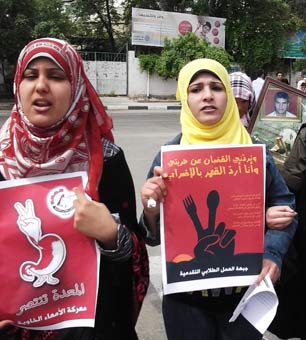 (Photo: Joe Catron / Flickr)Ramallah, Occupied West Bank – Official numbers estimate that nearly half of the prisoners presently being detained in Guantanamo Bay are on hunger strike. On April 16, clashes broke out when guards attempted to forcefully move detainees from their communal cells into single-person cells.
(Photo: Joe Catron / Flickr)Ramallah, Occupied West Bank – Official numbers estimate that nearly half of the prisoners presently being detained in Guantanamo Bay are on hunger strike. On April 16, clashes broke out when guards attempted to forcefully move detainees from their communal cells into single-person cells.
According to The Guardian, “around a dozen [prisoners] are being force-fed to keep them alive,” but other media put the number at over 15.
Amnesty International condemns the use of force-feeding, noting that it “it may amount to cruel, inhuman or degrading treatment.” During such force-feeding sessions, detainees are strapped to restraint chairs for hours at a time, and their extremities are tightly tied, their mouths gagged, and their nostrils subjected to invasive feeding tubes.
Further reports have emerged suggesting that the guards have displayed “deliberate indifference” to the hunger strikers, denying them drinkable water and basic medical necessities in a heartless attempt to crush their resolve and put an end to the mass hunger strike.
Despite appeals from lawyers and human rights organizations, who point out that several of the prisoners are on the brink of death, US District Judge Thomas Hogan denied an emergency motion for relief filed by one of the detainees, Musa’ab Omar Al-Madhwani, a Yemeni national arrested at just 22 years old and held for over a decade with neither charge nor trial. According to Hogan, Al-Madhwani had “self-manufactured” the “imminent danger” of death that his rapidly declining health now poses.
The hunger strikers, being held as part of the broader “war on terror” despite the United States government’s inability to prosecute them, highlight the resounding hypocrisy of the Obama administration. In 2007, while campaigning for his first presidential term, Obama vowed to “close Guantanamo, reject the Military Commissions Act and adhere to the Geneva Conventions.”
Upon ascending to presidency, Obama signed an executive order to close the detention center within one year. After retreating from political opposition, however, the White House granted itself an additional six months in July 2009. Since then, a series of limp excuses and ineffectual groans of intent have alighted from Washington, but Guantanamo, the moral outhouse of the American justice, remains the dumping ground for suspects that are ostensibly guilty of nothing more than being Muslim in shady places at the wrong time.
Meanwhile, a similar drama, draped in all the same moral infringements and bombastic insults to the basic tenets of habeas corpus, unfolds in Israel and the Occupied Palestinian Territories. According to Addameer Prisoner Support Network, 4,812 Palestinians were being held in Israeli military prisons as of February. From this total, 219 are classified as children, 31 of whom are under 16-years-old. 178 Palestinians are presently detained under the file of “administrative detention,” in which they are thrown behind bars indefinitely on the testimony of “secret evidence,” denied both charge and trial. According to Palestinian officials, 207 prisoners have died in occupation prisons since 1948.
Throughout the last few years, several prisoners launched lengthy hunger strikes that chalked up a number of successes against their jailers. In early 2012, administrative detainee Khader Adnan, accused of being an Islamic Jihad activist, staged a highly publicized 66-day hunger strike that, though it nearly costing his life, resulted in his eventual freedom.
Following in his footsteps, Hana Shalabi astoundingly went 43 days without food until Israel grudgingly agreed to release her. Shalabi rallied the Palestinian street behind her and inspired some 2,000 prisoners to go on mass hunger strike against their imprisonment. In exchange for ending their collective strike, Israeli Prison Services unenthusiastically agreed to end solitary confinement, allow family visits for prisoners from the Gaza Strip, improve basic living conditions and to not extend the sentences of then-present administrative detainees.
Nonetheless, Gavan Kelly of Addameer said in an interview that “Israel has reneged on almost all of the obligations on which it agreed.” Nothing could accurately portray the truthfulness of this statement more than the case of Samer Al-Issawi, a Jerusalem-born detainee who has pressed on for over eight months without food.
Israeli Prison Services tried to strike a deal in which Al-Issawi would be deported to Europe or Gaza. After stating his steadfast commitment to returning to his Jerusalem village or taking his hunger strike to the point of death, alongside months of Israeli officials vowing that the government will not cave in to Al-Issawi’s demands, Israel has grudgingly agreed to release him to his Jerusalem village.
Throughout the highly emotional trajectory of his hunger strike, an international campaign has sprung up to raise awareness about the plight of prisoners in Israeli lockup. From Guantanamo to Palestine, prisoners have served to cultivate a nascent form of international solidarity that unmasks the dual duplicity of American empire and its favored colonial outpost. Their empty stomachs continue to deliver a number of stultifying blows to the institutions of injustice.
Join us in defending the truth before it’s too late
The future of independent journalism is uncertain, and the consequences of losing it are too grave to ignore. To ensure Truthout remains safe, strong, and free, we need to raise $43,000 in the next 6 days. Every dollar raised goes directly toward the costs of producing news you can trust.
Please give what you can — because by supporting us with a tax-deductible donation, you’re not just preserving a source of news, you’re helping to safeguard what’s left of our democracy.
